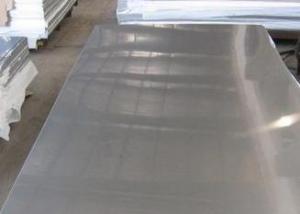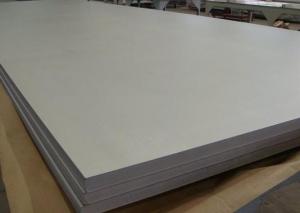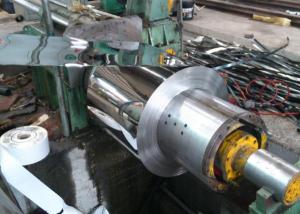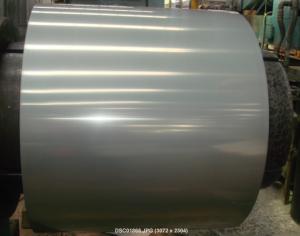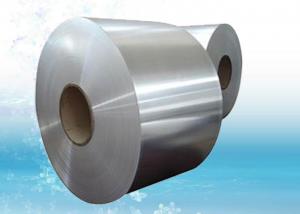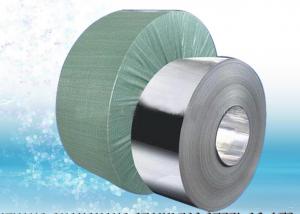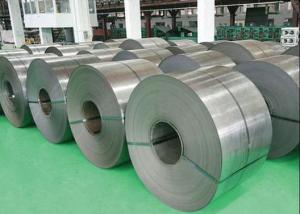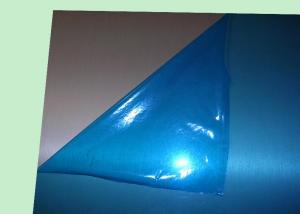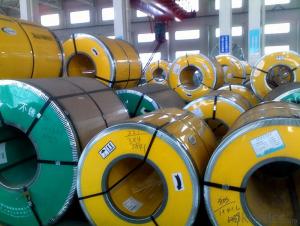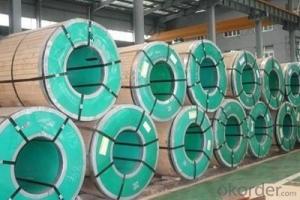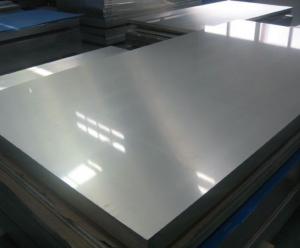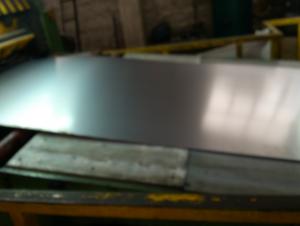AISI 201 Stainless Steel Sheet
- Loading Port:
- China Main Port
- Payment Terms:
- TT or LC
- Min Order Qty:
- 1 Ton m.t.
- Supply Capability:
- 1000 Tons Per Month m.t./month
OKorder Service Pledge
OKorder Financial Service
You Might Also Like
AISI 201 Stainless steel sheet
1. Chemical composition
|
C |
Si |
Mn |
P |
S |
Ni |
Cr |
|
max0.15 |
max1.00 |
5.50-7.50 |
max0.06 |
max0.03 |
max1.00 |
16.00-18.00 |
2. Mechanical properties
|
Yield Strength |
Tensile |
Elongation |
Hardness (HV) |
Hardness (HRB) |
|
245 |
640 |
40 |
253 |
100 |
3. Standard: AISI, ASTM, GB, EN, DIN, JIS
4. Surface: 2B, NO.1, BA, NO.4, Hairline, SB, Mirror finish, Anti-skid, Cherkered etc.
5. Size: Thickness: 0.3-3mm (cold rolled), 3-40mm (hot rolled)
Width: 1000mm or 1219mm or 1240mm for cold rolled, 1500mm for hot rolled.
Length: As customers' request.
6. MOQ: 1 Ton
7. Payment terms:T/T or L/C
8. Packing: Seaworthy package with wooden or Iron pallets with the paper and the steel strip, or as customers' request.
9. Delivery time: Usually about 7 days after we confirming the order, or according to your quantity.
If you have any question or demand, pls feel free to contact me.
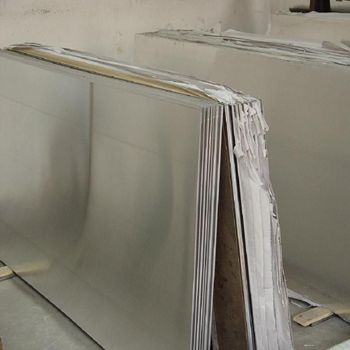
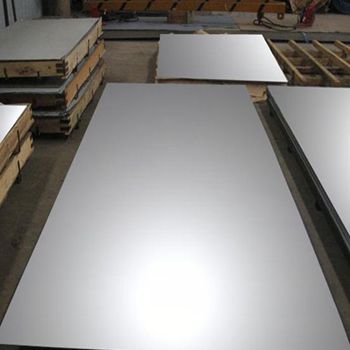
- Q:Are stainless steel strips resistant to chlorine corrosion?
- Yes, stainless steel strips are generally resistant to chlorine corrosion. Stainless steel is known for its high resistance to corrosion and staining, which makes it an ideal material for various applications that come into contact with chlorine, such as swimming pool equipment, water treatment plants, and chemical processing facilities. The addition of elements like chromium and nickel in stainless steel enhances its corrosion resistance, forming a passive oxide layer on the surface that protects the metal from the harmful effects of chlorine. However, it is important to note that the corrosion resistance of stainless steel can vary depending on the specific grade and composition of the alloy, as well as the concentration and temperature of the chlorine solution. Therefore, it is recommended to consult with a stainless steel expert or refer to the specific corrosion resistance charts provided by stainless steel manufacturers to ensure the suitability of stainless steel strips in a chlorine-rich environment.
- Q:Can stainless steel strips be used for electrical conductivity?
- No, stainless steel strips are not typically used for electrical conductivity. While stainless steel does have some electrical conductivity, it is relatively low when compared to other metals such as copper or aluminum. Therefore, stainless steel strips are not commonly used for applications that require high electrical conductivity.
- Q:Are stainless steel strips resistant to acetic acid?
- Stainless steel strips are typically resistant to acetic acid. Stainless steel is renowned for its ability to resist corrosion, which makes it suitable for various applications, even when exposed to acids. Acetic acid, commonly found in vinegar, is a mild acid and usually does not cause notable corrosion or harm to stainless steel. Nevertheless, extended exposure to concentrated acetic acid or other aggressive acids can still result in corrosion in certain types of stainless steel. Hence, it is crucial to take into account the precise grade and composition of the stainless steel strips when evaluating their resistance to acetic acid.
- Q:What are the applications of stainless steel strips?
- Due to their outstanding properties, stainless steel strips find wide-ranging applications across various industries. They are commonly used in construction and architecture for structural components, roofing, cladding, and facades. Their exceptional durability, corrosion resistance, and aesthetic appeal make them an ideal choice in architectural projects. In the automotive industry, stainless steel strips are utilized for manufacturing exhaust systems, trim components, and decorative parts. Their high strength, heat resistance, and corrosion resistance make them suitable for these purposes. Stainless steel strips are extensively employed in the production of kitchen appliances such as refrigerators, ovens, dishwashers, and sinks. Their hygienic properties, resistance to stains and corrosion, and ease of cleaning make them a popular choice in the kitchen. In the medical field, stainless steel strips are used for manufacturing surgical instruments, implants, and medical devices. Their biocompatibility, resistance to sterilization processes, and corrosion resistance make them suitable for use in healthcare settings. The petrochemical industry relies on stainless steel strips for manufacturing equipment like storage tanks, pipelines, and valves. The corrosion resistance of stainless steel strips is crucial in ensuring the safety and reliability of these critical components. The electronics and electrical industry also utilizes stainless steel strips in electronic devices, electrical contacts, connectors, and circuits. This is due to their electrical conductivity and corrosion resistance, which provide excellent shielding against electromagnetic interference and ensure long-term reliability. In the food processing industry, stainless steel strips are widely used for manufacturing equipment such as conveyors, mixers, tanks, and processing machinery. Their corrosion resistance, easy cleaning, and hygienic properties make them suitable for handling food products. In the aerospace industry, stainless steel strips are employed for manufacturing aircraft components like turbine blades, exhaust systems, and structural parts. Their high strength-to-weight ratio, resistance to extreme temperatures, and corrosion resistance are critical in aerospace applications. These examples highlight the versatility, durability, and corrosion resistance of stainless steel strips, making them the preferred choice in various industries where strength, reliability, and aesthetics are essential.
- Q:Can 111 stainless steel strips be used in cryogenic applications?
- Yes, 111 stainless steel strips can be used in cryogenic applications. 111 stainless steel is a ferritic stainless steel that contains a high percentage of chromium and low amounts of nickel, making it highly resistant to corrosion and suitable for use in low temperature environments. It has excellent mechanical properties and thermal conductivity, which are important factors for cryogenic applications. Additionally, 111 stainless steel has good ductility and can withstand the extreme temperatures found in cryogenic environments without becoming brittle or experiencing significant dimensional changes. Therefore, 111 stainless steel strips are a suitable choice for use in cryogenic applications where resistance to corrosion and low-temperature performance are required.
- Q:What is the toughness of stainless steel strips?
- Stainless steel strips are known for their exceptional toughness. The toughness of stainless steel refers to its ability to withstand high levels of stress and resist deformation or breaking under extreme conditions. This is due to the unique properties of stainless steel, including its high tensile strength and excellent impact resistance. Stainless steel strips are often used in applications where durability and toughness are crucial, such as in construction, automotive, and aerospace industries. They can withstand heavy loads, resist corrosion, and maintain their structural integrity even in harsh environments. Overall, stainless steel strips are highly regarded for their toughness and reliability, making them a popular choice in various industries.
- Q:Can stainless steel strips be used in the chemical manufacturing industry?
- Yes, stainless steel strips can be used in the chemical manufacturing industry. Stainless steel is highly corrosion resistant, making it suitable for handling various chemicals and corrosive substances. It also offers excellent strength and durability, ensuring a long service life in harsh chemical environments. Additionally, stainless steel can withstand high temperatures, making it ideal for use in chemical manufacturing processes that involve heat.
- Q:Can stainless steel strips be used in electrical enclosures?
- Yes, stainless steel strips can be used in electrical enclosures. Stainless steel is a popular choice for electrical enclosures due to its corrosion resistance, durability, and ability to withstand harsh environments. Stainless steel strips can be used to reinforce the structure of the enclosure or to provide grounding. Additionally, stainless steel has good electrical conductivity, which makes it suitable for use in electrical applications. It is important to choose the appropriate grade of stainless steel based on the specific requirements of the enclosure to ensure optimal performance and longevity.
- Q:What are the recommended cleaning and maintenance practices for 111 stainless steel strips?
- When it comes to cleaning and maintaining 111 stainless steel strips, there are a few recommended practices to ensure their longevity and appearance. Firstly, it is important to regularly clean the stainless steel strips to prevent the buildup of dirt, grime, and fingerprints. A mild detergent or soap and warm water solution can be used to clean the surface. It is crucial to avoid using abrasive cleaners, harsh chemicals, or steel wool as these can damage the stainless steel. To remove tough stains or residue, a non-abrasive cleaner specifically designed for stainless steel can be used. It is important to follow the manufacturer's instructions while using these cleaners and avoid contact with other surfaces. After cleaning, it is recommended to rinse the stainless steel strips thoroughly with clean water and dry them with a soft cloth or towel. This will prevent water spots or streaks from forming on the surface. In terms of maintenance, it is advisable to regularly inspect the stainless steel strips for any signs of damage, such as scratches or dents. If any damage is found, it should be addressed promptly to prevent further deterioration. It is also important to avoid exposing the stainless steel strips to extreme temperatures or prolonged contact with acidic substances, as these can cause discoloration or corrosion. Additionally, it is recommended to avoid using sharp objects or abrasive materials on the surface to prevent scratches. Lastly, a protective coating or polish specifically designed for stainless steel can be applied to enhance its shine and provide an extra layer of protection. It is important to follow the manufacturer's instructions while applying these products. By following these recommended cleaning and maintenance practices, the 111 stainless steel strips can remain in optimal condition, making them more durable and visually appealing in the long run.
- Q:Are stainless steel strips suitable for automotive fuel systems?
- Yes, stainless steel strips are suitable for automotive fuel systems. Stainless steel is highly resistant to corrosion, making it an ideal material for components in fuel systems that are constantly exposed to fuel and moisture. Its durability and strength also ensure the longevity of the fuel system components.
1. Manufacturer Overview |
|
|---|---|
| Location | Changsha,China |
| Year Established | 2003 |
| Annual Output Value | Above US$36 billion |
| Main Markets | Mid East;Western Europe;North America |
| Company Certifications | ISO 9001:2008; |
2. Manufacturer Certificates |
|
|---|---|
| a) Certification Name | |
| Range | |
| Reference | |
| Validity Period | |
3. Manufacturer Capability |
|
|---|---|
| a)Trade Capacity | |
| Nearest Port | Changsha |
| Export Percentage | 0.8 |
| No.of Employees in Trade Department | 160,000 People |
| Language Spoken: | English;Chinese;Japanese |
| b)Factory Information | |
| Factory Size: | Above 3,000,000 square meters |
| No. of Production Lines | Above 10 |
| Contract Manufacturing | OEM Service Offered;Design Service Offered |
| Product Price Range | Average |
Send your message to us
AISI 201 Stainless Steel Sheet
- Loading Port:
- China Main Port
- Payment Terms:
- TT or LC
- Min Order Qty:
- 1 Ton m.t.
- Supply Capability:
- 1000 Tons Per Month m.t./month
OKorder Service Pledge
OKorder Financial Service
Similar products
New products
Hot products
Hot Searches
Related keywords
